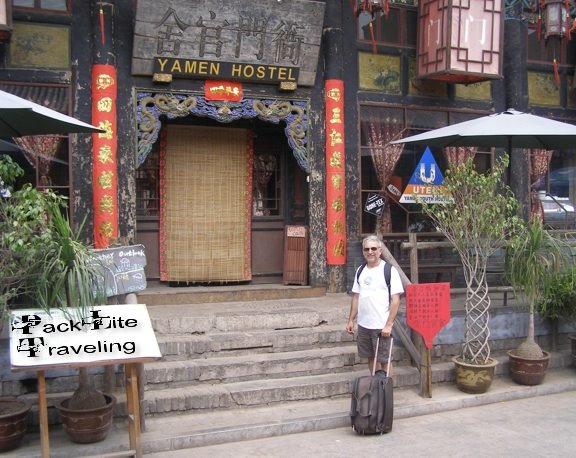Published in the Wooster Daily Record June 7
___________________Ni hao. Hello from Kaifeng, China, where I am teaching at Henan University for a semester.
Last weekend a group of students from The University of Akron visited Kaifeng. Among them was a political science graduate student. He had been looking forward to engaging Chinese about his area. Much to his disappointment, he hadn't found anybody who shares his interest.
I know how he feels. I've found the same. Don't bother to trying to talk politics with the Chinese.
When I've broached the topic with my students, the response is usually dismissive. "Politics are boring." Students are required to take a course in the philosophy of Mao and Deng Xiaoping and the other architects of contemporary China. I should say, "suffer through." They hate the course.
If we Americans are so inclined, we can immerse ourselves in a sea of political news analysis. The Chinese are to a large degree disinterested. Naturally I think the answer lies in history and the national character it has produced.
Chinese civilization is rooted right here in Henan Province. It was nurtured by the Yellow River which is both revered and feared. The endless silt has raised the river higher than the surrounding plain, posing a constant threat of floods. From earliest times it was the Emperor's job to coordinate defense. He even wore yellow to symbolize his connection with the Yellow River.
To this day the communities along the river are required to provide work groups to maintain the all-important levees. Such a vast effort necessitates strong central control and coordination. Dynasties fell when they flubbed their river duties.
To the Chinese masses, government has long been just another burden to be borne without complaint. Chinese people largely devote themselves to the most important relationships of family and friends. They are intensely proud of their country, its history and culture. When conversations touch on politics they're usually about the shortcomings of the local government. There is never even the hint that the people can do anything about problems. Government acts, we adjust.
There are some anomalies and I recently encountered one of the biggest: Shirley Wood. I've been prodding her grandson who is a student in one of my freshman classes all semester to arrange a meeting. Shirley needed little prodding to launch into a rambling account of her life. An American born on a coffee plantation in what was then Rhodesia, she returned to the USA for high school in Texas. While a student at Michigan State she fell in love with and married a Chinese veterinary student.
 She journeyed to China with him in 1946, landing in a nation that had staggered from the Anti-Japanese War to Civil War. Very quickly Shirley found herself a mother pregnant with number two; She was also a refugee moving from city to city trying to stay ahead of the fighting. After a cinematic odyssey through a land roiling with revolution, she settled down while her husband took a position at Henan University. He felt Kaifeng was too backward for her. They lived apart for three years until she said that was no way to raise children. She established the family in a village outside Kaifeng.
She journeyed to China with him in 1946, landing in a nation that had staggered from the Anti-Japanese War to Civil War. Very quickly Shirley found herself a mother pregnant with number two; She was also a refugee moving from city to city trying to stay ahead of the fighting. After a cinematic odyssey through a land roiling with revolution, she settled down while her husband took a position at Henan University. He felt Kaifeng was too backward for her. They lived apart for three years until she said that was no way to raise children. She established the family in a village outside Kaifeng.Somewhere along the way she renounced her American citizenship and became a Chinese national. A rarity in her new land, she was asked to teach English at the university and settled into a professorship. During the Cultural Revolution of the late sixties Zhou Enlai, Mao's number two, commanded, "Leave that woman alone!" She came through that halcyon time unscathed.
Shirley had in a house on southern border of the university Expansion took it but her bamboo lives on, transplanted all over campus. Now retired, she resides in a nice home only a few blocks north, cared for by some of her grandchildren. Most her family has returned to the land of her birth and lives in New York City. She's got quite a story but, fully a part of her adopted land, she manages to recount it in an apolitical manner.
No, I've not been spied on or censored in any way. No one has told me what I can or cannot say inside or outside the classroom. People do not speak in hushed and feared tones. The police seem to have decent relations with the people. The Communist Party holds unchallenged power. Membership is essential to rise in government or to the top tiers of the university.
The politics of personality play large on both sides of the Pacific. When I showed a picture of George W. Bush during a recent lecture, the Chinese students actually booed. Another slide of our current president and his family brought a cheer of approval. The ultimate accolade: the cell phones came out and they took pictures of the picture.
Most of my students are mostly concerned with getting a good job or starting a business. Above all, they want to make money. Perhaps the gap is not so great. American students often have the same focus.
So long as the Party facilitates these goals and takes care of the river then all is as it always has been in the ancient land of China.
